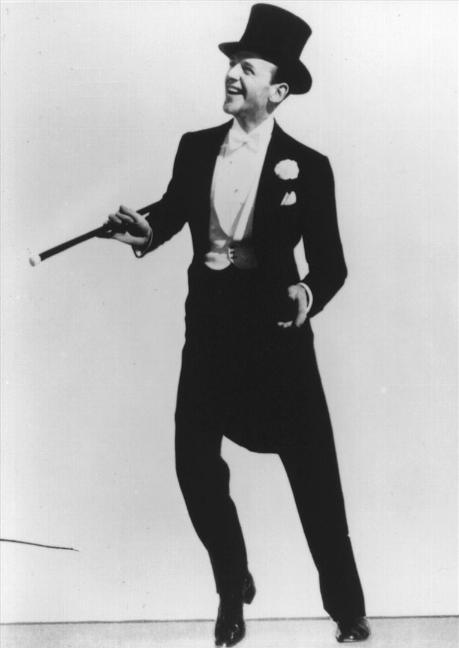
Astaire, Fred
Fred Astaire (born Frederick Austerlitz;[1] May 10, 1899 – June 22, 1987) was an American actor, dancer, singer, choreographer, and television presenter. He is widely considered the greatest popular-music dancer in history.[2]
His stage and subsequent film and television careers spanned a total of 76 years. He starred in more than 10 Broadway and West End musicals, made 31 musical films, four television specials, and numerous recordings. As a dancer, his outstanding traits were an uncanny sense of rhythm, perfectionism, and innovation. His most memorable dancing partnership was with Ginger Rogers, with whom he co-starred in a series of ten Hollywood musicals during the age of Classical Hollywood cinema, including Top Hat (1935), Swing Time (1936), and Shall We Dance (1937).[3] Among the other notable films in which Astaire gained further popularity and took the genre of tap dancing to a new level were Holiday Inn (1942), Easter Parade (1948), The Band Wagon (1953), Funny Face (1957), and Silk Stockings (1957). The American Film Institute named Astaire the fifth-greatest male star of Classic Hollywood cinema in 100 Years.
Although he possessed a light voice, he was admired for his lyricism, diction, and phrasing[47]—the grace and elegance so prized in his dancing seemed to be reflected in his singing, a capacity for synthesis which led Burton Lane to describe him as “the world’s greatest musical performer.”[25]:21 Irving Berlin considered Astaire the equal of any male interpreter of his songs—”as good as Jolson, Crosby or Sinatra, not necessarily because of his voice, but for his conception of projecting a song.”[48] Jerome Kern considered him the supreme male interpreter of his songs[25]:21 and Cole Porter and Johnny Mercer also admired his unique treatment of their work. And while George Gershwin was somewhat critical of Astaire’s singing abilities, he wrote many of his most memorable songs for him.[25]:123, 128 In his heyday, Astaire was referenced[48] in lyrics of songwriters Cole Porter, Lorenz Hart and Eric Maschwitz and continues to inspire modern songwriters.[49]
Astaire was a songwriter, with “I’m Building Up to an Awful Letdown” (written with lyricist Johnny Mercer) reaching number four in the Hit parade of 1936.[50] He recorded his own “It’s Just Like Taking Candy from a Baby” with Benny Goodman in 1940 and nurtured a lifelong ambition to be a successful popular song composer.[51]
During 1952, Astaire recorded The Astaire Story, a four-volume album with a quintet led by Oscar Peterson. The album, produced by Norman Granz, provided a musical overview of Astaire’s career. The Astaire Story later won the Grammy Hall of Fame Award in 1999, a special Grammy award to honor recordings that are at least twenty-five years old and that have “qualitative or historical significance.”[52]
